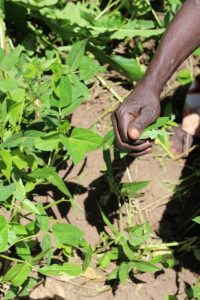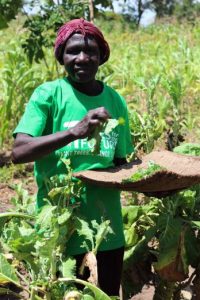This project is made possible through the partnership of WATER CHARITY and the NATIONAL PEACE CORPS ASSOCIATION. ![]()
This project has been completed. To read about the conclusion, CLICK HERE.
Location
Kole District, Northern Uganda
Community Description
The Kole District in Northern Uganda is home to rolling hills of farmland that is plowed by hand or oxen. The Langis and Acholis tribes make up the majority of people in this region, extending to the west and north toward South Sudan. Life in Kole was significantly disrupted in the mid-1990s when Joseph Kony and the Lord’s Resistance Army (LRA) rose up against the government and attacked civilians in the northern half of the country. During this time, almost two million residents were affected and forced to flee their homes or lose their lives.
When the LRA insurgency ended, there was widespread international support for farmers and other displaced people returning to Kole, but since then large NGOs such as World Vision, Care International, Action Aid, and the United Nations have ended their programming in these regions. The majority of agricultural programming over the past 30 years by the international community has encouraged mono-cropping of one or few crops on farmers’ lands, ultimately contributing to the loss of agricultural and ecological biodiversity across the landscape.
Problem Addressed
Many Kole households continue to rely on open streams for domestic water collection. However, because of pollution and agricultural runoff from the villages along the streams, much of this water is unsafe for domestic use. Farmers need to improve water quality, build soil health, and conserve precious resources.
Despite the fact that the Lango culture prevalent in Kole is male-dominated, women are responsible for nearly all of the domestic and agricultural family activities. It is the women that grow food, collect water, build and maintain houses, educate children, and generate income for the home, and have the greatest need for improved techniques.
Formerly displaced persons are very much affected by the use of improper farming techniques in their effort to earn a living. Farmers who left their lands during the Lord’s Resistance Army insurgency have returned now and are practicing conventional, destructive farming techniques. As farmers continue to clear brush and trees to plant crops year-round, soil fertility is quickly depleting. Tree cover is disappearing in Kole, Uganda due to human encroachment on forests.
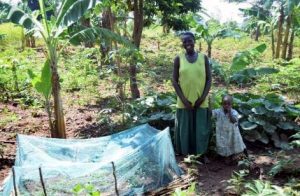 Project Description
Project Description
The overall goal of the Kole Forest Garden Project is to increase the food security and income of 282 families in Kole, Uganda, by transforming their degraded fields into sustainable Forest Gardens. This project will help farmers and their families break the cycle of poverty.
The Forest Garden system is a multi-tiered mixture of trees, shrubs, and crops that is grown on one to two acres of land. Trees have long been a vital resource for smallholder farmers since, once established, they require very little labor and resources to be productive. Centering farms around trees is not difficult, but most African farmers are resource- and technology-poor and are stuck in a losing battle growing short-term cropping to meet short-term needs.
Locally-based technicians will work on-the-ground with farmers to design Forest Gardens which will maximize yields and provide a consistent income, while also improving the quality of the land being farmed.
Key objectives over the next 12 months of this project include:
1) Provide support and training to 282 farmers in Kole, Uganda on Forest Garden design and nursery development and maintenance,
2) Plant approximately 600,000 trees on Forest Garden sites to protect and fertilize soils through the establishment of green walls, contour lines, and planting of nitrogen-fixing, fertilizer trees; begin out-planting, and conduct training events on composting, integrated pest management strategies, and perma-garden growing techniques, and
3) Establish 282 garden beds—one for each farmer—with a diverse mix of nutritious vegetables and fruits surrounded by fodder and timber trees.
The activities will include:
● Out-planting trees
● Composting and Integrated Pest Management training
● Tree and vegetable nurseries
● Farmer sample survey and evaluations
● Gardening training
● Annual review and planning meeting
● Tree and vegetable out-planting
● Fruit tree nursery training
● Fruit tree nurseries
● Fruit tree out-planting training
● Out-planting fruit trees
The work is being carried out by Trees for the Future, founded in 1989 to combat unsustainable land-use practices in the developing world. Its mission is to improve the livelihoods of impoverished farmers by revitalizing degraded lands.
Water Charity funds will be used to pay for agroforestry tree seeds, fruit tree seeds and cuttings, vegetable seeds, materials, tools, and transport.
Project Impact
1,700 people in 282 families, from 13 different small farmer groups, will benefit from the project. Combined, these families will transform 277 acres (112 hectares) of previously degraded land into prolific, diverse, and permanent Forest Gardens.
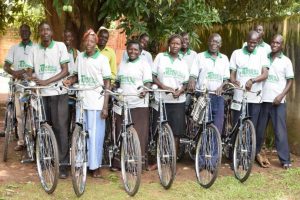
Project Manager
Ashleigh Burgess, Returned Peace Corps Volunteer, Senegal (2011-14), Trees for the Future
Monitoring and Maintenance
To measure the overall impact of the Kole Forest Garden program during the entire project term (estimated to be completed by March 2020), the measurable objectives are to:
1) Increase sustainability of rural landscapes for 282 Kole farmers by establishing environmentally responsible agricultural systems—indicated by the number of farmers who have established Forest Garden sites,
2) Increase household food security for Kole farmers through increased access to food over an annual period—indicated by USAID’s Household Food Insecurity Access Score, and
3) Increase household resilience to economic instability for Kole farmers over an annual period—indicated by USAID’s Household Resilience Capacity Score.
Comments
The Forest Garden approach is designed to help farmers improve water quality through conservation practices, decrease reliance on costly and environmentally harmful pesticides and fertilizers, build soil health, and conserve precious resources. In addition, the project will provide the entire community with the tools and resources to be successful in growing food and preserving the environment for years and generations to come.
This project has been funded by an anonymous donor.
If you are moved by this model, which has a lifelong impact on the well-being of the community while protecting the environment and improving the water supply, please Donate using the button below. Your contribution will be allocated to similar projects in nearby locations.
 Conclusion of Kole Forest Garden Project – Uganda
Conclusion of Kole Forest Garden Project – Uganda
This project has been completed under the direction of Peace Corps Volunteer Ashleigh Burgess. To read about the start of the project, 
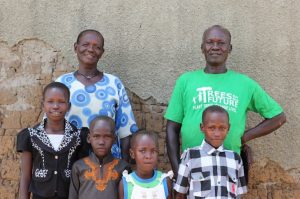
The project was designed to increase food security and income of 282 families in Kole, Uganda, by transforming their degraded fields into sustainable Forest Gardens.
To see Ashleigh’s complete report, CLICK HERE
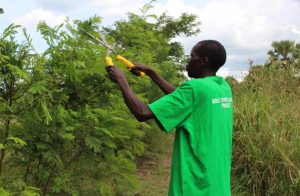 A summary of Ashleigh’s report is as follows:
A summary of Ashleigh’s report is as follows:
The Kole project began in April 2016 and is now in Phase 2, and will enter phase 3 in early 2018. Water Charity’s involvement with TREES’ Kole, Uganda Forest Garden project formally began on December 23, 2016.
The overall goal of the Kole Forest Garden Project is to increase food security and income of 282 families in Kole, Uganda, by transforming their degraded fields into sustainable Forest Gardens. This project helps farmers and their families break the cycle of poverty while restoring 112 hectares of previously degraded land into sustainable production, while planting 1,128,000 trees over a four-year project period (approximately 600,000 trees in during the project reporting period). 282 farmers are involved in the Kole project, which includes 1,800 indirect project beneficiaries.
The Forest Garden Approach is a multi-tiered mixture of trees, shrubs, and crops that is grown on one to two acres of land. It is a system of agriculture that has been used successfully for hundreds of years around the globe. Trees have long been a vital resource for smallholder farmers since, once established, they require very little labor and resources to be productive. Centering farms around trees is not difficult, but most African farmers are resource- and technology-poor and are stuck in a losing battle growing short-term cropping to meet short-term needs.
Following are the accomplishments:
Farmer sample survey and evaluations (January/ February 2017)
TREES requires an annual sample survey to measure the economic and environmental benefits of its program. The first sample survey outside of the baseline survey was conducted in January and February of 2017. The preliminary results showed us that Kole farmers are experiencing higher food security, higher dietary diversity, and higher incomes with Forest Gardens after the first year than before they hadGardening training (February 2017)
Gardening training is a key element to Forest Gardens. Building on compost and IPM training, the Kole farmers completed gardening training to learn improved planting techniques for their upcoming vegetable out-planting. These techniques play heavily into best garden design practices, such as incorporating permaculture techniques (e.g. building berms and swales) to keep water from running off a sloped part of their fields. The gardening training gives a forum for farmers to talk to each other about their techniques and learn from TREES technicians about how to improve planting, spacing, and general on-farm productivity with techniques like companion planting, intercropping, and crop layering.
Fruit tree nursery training (April 2017), fruit tree nursery growing (June/ July 2017)
The farmers in Kole learned to start their own fruit tree nurseries, growing avocados, cashews, oranges, mangoes, and other local fruit trees in bare-root and traditional nurseries. Many of the techniques required to grow successful nurseries are the same as previous nursery trainings. However, fruit trees require special care as they tend to take longer to grow. Farmers learned the important techniques necessary to grow healthy seedlings, such as seed selection, scarification, and preparation, proper planting techniques, and incorporating compost and IPM into their nurseries. Planting fruit trees requires additional preparation and TREES ensures that farmers have mastered the essential techniques for upcoming out-planting, such as mulching tree bases, protecting fruit trees, and spacing of trees.Fruit tree out-planting training (July 2017)
Farmers out-planted their fruit trees in their Forest Gardens, with special attention to spacing, sun patterns, and water flow throughout their plots.Out-planting fruit trees (August-October 2017 )
As some fruit trees require longer in their nurseries to ensure that they are hardy enough to withstand growing in a field, a second round of fruit tree out-planting follows the earlier planting period. Kole farmers will graft these trees in 2018. The tools and materials (e.g. seeds, cuttings) that Water Charity has helped to furnish as part of this project have been used in the nursery establishment and out-planting activities.Director and staff site visits to capture reporting data (October-December 2017)
TREES collects impact data from the year to ensure that we are hitting our target tree planting numbers and to check in with each farmer as they prepare for year three activities. Our technicians collect this impact data, along with pictures and stories of farmers, and our East Africa Director supervises the process to guarantee quality data collection. The Director meets with each farmer to hear feedback on the program and learns what is going well, how the local staff is doing, and what may need changing in the third year of the project.
We extend our thanks to Ashleigh for completing this important project.
